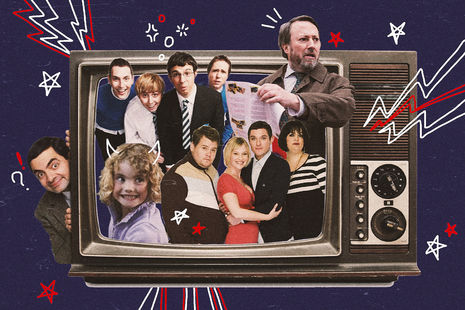Has British TV comedy still got it?
Freya Compton considers the current state of British TV comedy

British TV comedy has changed in many ways over the decades since it boomed in the 80s, moving from physical gags and Mr Bean, to iconic characters like Geraldine Granger and Malcom Tucker, and then progressing to the much-loved British sarcasm and honesty-characterising childhood favourites like Outnumbered and The Inbetweeners.
But, as with many creative industries today, there is an ever-present financial threat. A fast-paced change in our watching patterns, paired with the new demands of production, are resulting in fewer 25-episode series and more two-year wait periods resulting in a six-part limited series. The big question is, therefore, whether more money actually equals more funny. What has flown and what has flopped in recent years? And what does this tell us about the future of BBC, ITV, and Channel 4 comedy?
At the BBC comedy festival in May, an announcement from comedy director Jon Petrie that ten classic British comedies would return highlights what many agree is the best route forward: focusing on the secrets behind our past successes.
With classics like The Office and Shameless spawning American remakes, and favourites like Friday Night Dinner and Green Wing gaining international fan bases, you cannot deny that homegrown on-screen comedy has soared. The trick behind this is its simplicity. Hilarious characters found within ordinary settings, caught in the regular moments that make up our lives. An IT department, family home, rural village, school run, hospital ward, flat share – our banal experiences are reflected in big personalities. This creates the distinctive comedy that we’re known for, the stuff that contrasts so sharply to the flashy American humour that can fly, but usually flops, with UK audiences.
“It’s far from easy to capture the attention of the nation with a new show found deep within iPlayer, All 4, or even worse, live TV”
Petrie recognised this, and indeed new shows like Here We Go and This Country perfectly exemplify how this style can continue to succeed in a new generation. And it’s clear that UK audiences are still hungry for comedy, with BBC’s Ludwig and Gavin and Stacey Christmas Special setting records with their audiences. But it’s far from easy to capture the attention of the nation with a new show found deep within iPlayer, All 4, or even worse, live TV.
In fact, when you look deeper, you see that, as well as being hilarious and lovable, many of these new successes had something else going for them. Amandaland gained traction with young audiences where other shows failed, but this is arguably thanks to its forefather, Motherland, being on Netflix, where it could grow in popularity, while other BBC sitcoms get lost in the iPlayer archives. Ludwig is an example of the dramatised comedy that is favoured by the necessary big money investors, but is not a substitute for the comedy-focused gems that become engrained into British culture itself.
“We don’t get the unique, outlandish characters that we love by not taking chances on unique, brave writers”
The other issue with this emphasis on reviving old favourites is that doubling down on classics means doubling down on the lack of diversity in British comedy. Nine of the ten recommissioned shows are written by white men. All ten are fronted by white actors. When you pair this with the disproportional barriers facing those with a minority background aiming for the TV industry, it’s no surprise if our screens continue to lack the diversity reflecting Britain.
There’s a delicate balance in reviving British comedy financially, by recognising the strength of its simplicity, and giving space to a new and diverse range of creative geniuses. We don’t get the unique, outlandish characters that we love by not taking chances on unique, brave writers.
At the end of the day, audiences don’t care how a show is made, how long it’s anticipated for, or how high quality the filming is: they care if it made them laugh. This is why the future of British TV comedy lies in new, creative ambition, grounded in the classic simplicity of relatable British life. This doesn’t mean producing just another hospital comedy, but instead recognising the comedic value of so many untold corners of UK life.
 News / Cambridge academics sign open letter criticising research funding changes22 February 2026
News / Cambridge academics sign open letter criticising research funding changes22 February 2026 News / University Council rescinds University Centre membership20 February 2026
News / University Council rescinds University Centre membership20 February 2026 News / Supporters protest potential vet school closure22 February 2026
News / Supporters protest potential vet school closure22 February 2026 News / Hundreds of Cambridge academics demand vote on fate of vet course20 February 2026
News / Hundreds of Cambridge academics demand vote on fate of vet course20 February 2026 Comment / A tongue-in-cheek petition for gowned exams at Cambridge 21 February 2026
Comment / A tongue-in-cheek petition for gowned exams at Cambridge 21 February 2026








